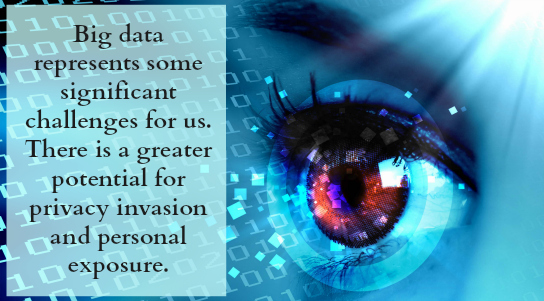One of the buzzwords in business and government these days is “big data.” We are able to collect and analyze information in ways never before possible. This gives trend watchers, businesses, corporations, and governments the ability to understand the world in new and more accurate ways.
On the other hand, big data represents some significant challenges for us. There is a greater potential for privacy invasion and personal exposure. Mistakes in data collection or analysis can even result in damaging a person’s character or credit rating.
A major concern is over how much information is being collected on each of us by both the public sector and private sector. Government and businesses are collecting and retaining massive data sets on every person. They are also making assumptions and extrapolating from the data. It may not bother you that businesses are using this data to guess what purchases you might make next year. It should bother you that other entitles (like the government) are using the data to assess what kind of person you are based upon your purchases of reading material and consumer goods.
Big data can also accentuate class differences. Already insurance companies treat the healthy differently than the sick. People who are rich, well educated, and influential receive better treatment from companies than those who are poor and underprivileged. Credit card companies already treat people with a good credit history better than those who do not. Now we are learning that they are using information about the payment history of other customers to assess the credit-worthiness of a potential customer.
It is easy to disregard such assessments if you have a good credit score. But what if there are erroneous records in all of the big data that is collected? Anyone who has worked to clear up inaccurate records can see the potential danger of big data. Often it takes time and tenacity to get back your good name. That is why we need to pay attention to the collection, analysis, and storage of big data.
 Listen Online
Listen Online Watch Online
Watch Online Find a Station in Your Area
Find a Station in Your Area










 Listen Now
Listen Now Watch Online
Watch Online
